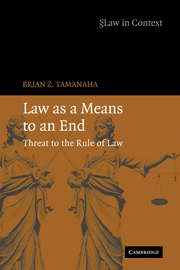Book contents
- Frontmatter
- Contents
- Acknowledgments
- Introduction
- Part 1 The spread of legal instrumentalism
- Part 2 Contemporary legal instrumentalism
- 6 Instrumentalism in legal academia in the 1970s
- 7 Instrumentalism in theories of law
- 8 Instrumentalism in the legal profession
- 9 Instrumentalism of cause litigation
- 10 Instrumentalism and the judiciary
- 11 Instrumentalism in legislation and administration
- Part 3 Corroding the rule of law
- Epilogue
- Index
- Titles in the series
7 - Instrumentalism in theories of law
Published online by Cambridge University Press: 25 July 2009
- Frontmatter
- Contents
- Acknowledgments
- Introduction
- Part 1 The spread of legal instrumentalism
- Part 2 Contemporary legal instrumentalism
- 6 Instrumentalism in legal academia in the 1970s
- 7 Instrumentalism in theories of law
- 8 Instrumentalism in the legal profession
- 9 Instrumentalism of cause litigation
- 10 Instrumentalism and the judiciary
- 11 Instrumentalism in legislation and administration
- Part 3 Corroding the rule of law
- Epilogue
- Index
- Titles in the series
Summary
Almost all of the major theoretical and empirical perspectives toward law that circulate today developed during the 1960s and 1970s, or have roots in that period, and characterize law in fundamentally instrumental terms. The economic analysis of law, critical legal studies and their progeny, the law and society movement, legal pragmatism, and the formal version of the rule of law, each in central respects builds its understanding around the proposition that law is a means to an end. Many of these schools of thought also take an instrumental view toward their own scholarship and toward the scholarship of others. That is, as a consequence of general skepticism about the capacity to achieve objectivity, there is a widespread sense that theories of law, and knowledge about law, are inevitably colored by politics, akin to the assumption that politics influences judging.
These various schools of thought are given an abbreviated sketch, in the order just set out, limited to revealing their core instrumental components. This narrowly focused survey shows how instrumentalist views permeate theoretical understandings of law. At the close of the chapter is a brief mention of the non-instrumental theories of law that hang on against the tide.
Economic analysis of law
The starting assumption of economic analysis of law is “that the people involved with the legal system act as rational maximizers of their satisfaction.”
- Type
- Chapter
- Information
- Law as a Means to an EndThreat to the Rule of Law, pp. 118 - 132Publisher: Cambridge University PressPrint publication year: 2006

